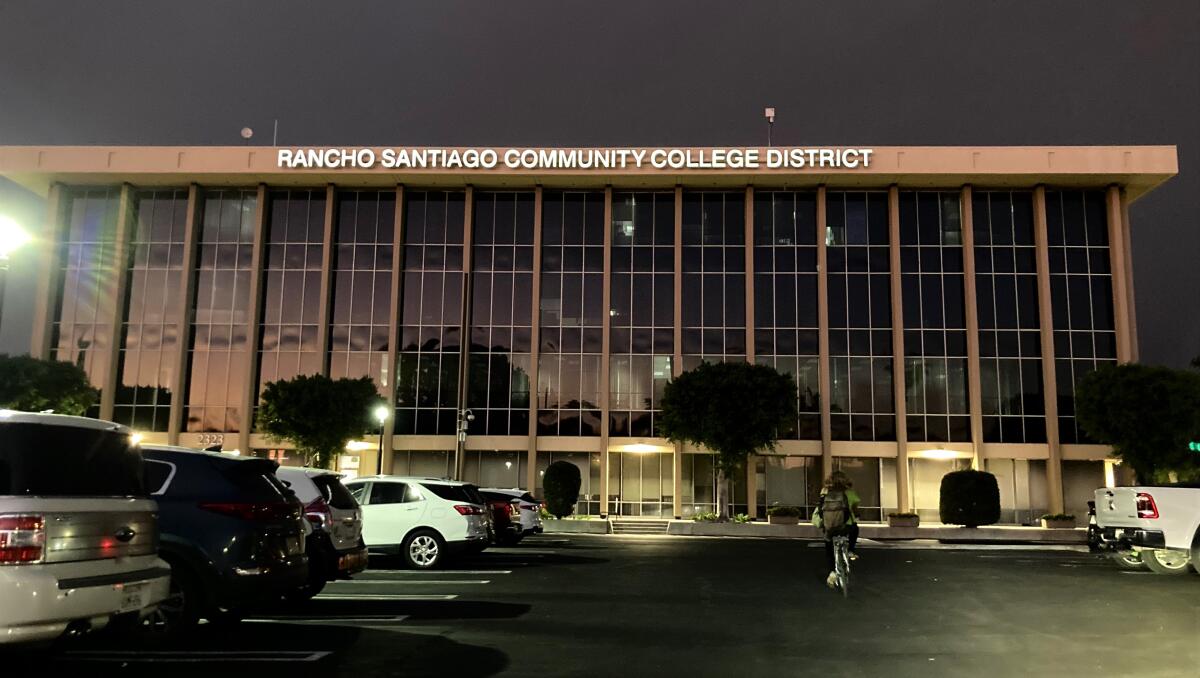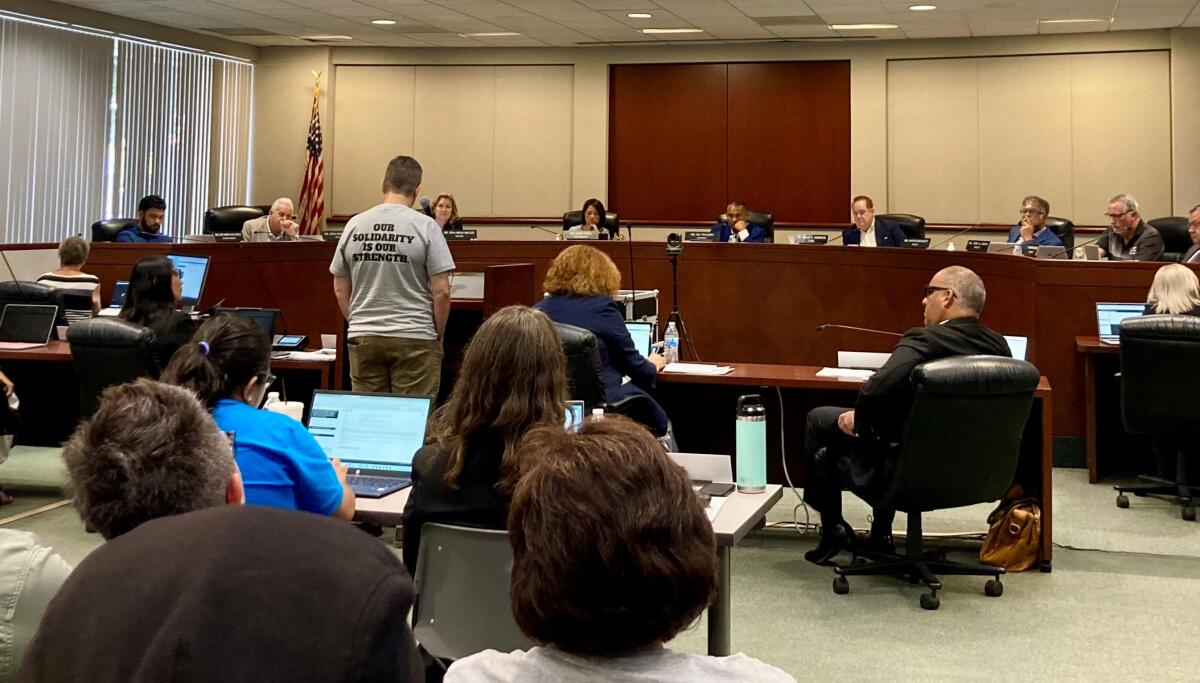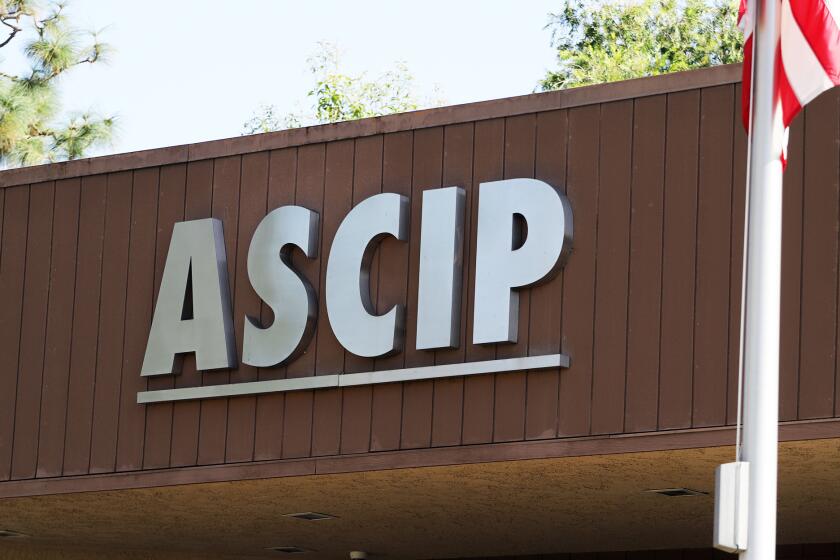College district keeps policy with ASCIP, as top officials evade inquiry into $7M fund

- Share via
Rancho Santiago Community College District officials Monday approved keeping a $30-million employee health policy in the hands of an insurance risk pool operator recently criticized for keeping millions of the district’s money for years in a little-known account.
Moved by overwhelming feedback from employees keen on keeping their medical doctors, treatment and coverage intact, RSCCD trustees voted unanimously to retain the Anthem Blue Cross policy maintained by the Alliance of Schools for Cooperative Insurance Programs for a three-year period.
The Cerritos-based agency is the same one that in June cut a $7.1-million check to the district, after it came to light that a risk management fund held by ASCIP had quietly accumulated insurance dividends that, if made known to elected officials, could have been spent at any time.
Kept off the books, and outside the awareness of elected officials, a risk management fund held for Rancho Santiago CCD by a risk pool operator quietly accrued millions — until people started asking about it.
Instead, the funds grew as district administrators — most likely two now-retired cabinet members whose affiliations with the joint powers authority preceded and outlasted their tenures at Rancho Santiago CCD — apparently managed and spent from the account without the board’s full knowledge.
Now, one elected official is demanding a full accounting of the risk management fund, even as the district’s chancellor and a key administrator evade questions about what happened and who knew what.
District faculty and staff packed the Rancho Santiago boardroom Monday evening to share their opinions on whether the district should continue receiving employee health benefits through Anthem, using ASCIP’s risk pool, or switch to competitor Aetna.
Employees’ favor resoundingly landed on the former, recommended 8-2 by the district’s advisory Joint Benefits Committee and affirmed by Chancellor Marvin Martinez. Staying in the pool would allow the policy to earn dividends, or rebates, during periods when premium payments eclipsed claims.

Tiffany Gause, a Santiago Canyon College social sciences professor and officer of the district’s faculty union, urged the board to affirm the benefits committee’s recommendation to stay with Anthem, reached after an exhaustive process.
“We came together, did what was best for all involved and made the right decision,” Gause said, outlining a series of meetings and presentations held over the summer. “We need to rely on process and not be blindsided or uninformed, especially on an important decision like this.”
Santiago Canyon reading instructor Amy Freese shared how her husband has received life-saving cancer treatment at the UC Irvine Medical Center, thanks to the district’s HMO plan.
“I can’t imagine what so many of us would go through if we needed to leave UCI and change any of our medical groups. Could that be life altering? I think that it could be,” Freese said.
“The employees of our district are living through some very hard things. And Board of Trustees, you have the opportunity to make another positive difference for us and our families.”
As stakeholders of the Orange County community college district probe a decades-long relationship with the Alliance of Schools for Cooperative Insurance Programs, the names of two now-retired administrators keep popping up.
Through sheer coincidence, Monday’s vote followed on the heels of the discovery in late May that ASCIP had been maintaining the risk management fund not accounted for in the district’s budget and outside the awareness of trustees, that had amassed $7.1 million.
Trustee Phil Yarbrough, who chairs the board’s fiscal audit committee, demanded in a June 10 meeting a full remittance of the funds and called for an audit to track the full life of the fund. He reiterated his call for an investigation Monday.
“There are two issues here. There’s the issue about who our health provider’s going to be, and the second issue is in regard to the refund account that had been going on since a year after I was elected [in 1996],” he said. “I’ve got a bunch of questions about that and I’ve got a bunch of materials I need to get answers on.”
Trustee Tina Arias Miller asked where in the district’s budget the $7.1 million had been placed and whether it might be used to offset future healthcare premiums or pay for other unforeseen employee healthcare-related expenses.
Iris Ingram, vice chancellor of business services, explained board policy stipulates any one-time revenue received be automatically held in Rancho Santiago’s reserve fund. Spending from that account, she added, requires approval by a two-third board majority.
“So it requires an additional hurdle now to take that money out of there,” she said. “And once the revenue goes into the reserves, it becomes a situation [where] all money is green.”
Chancellor Martinez and Vice Chancellor Ingram were asked multiple times to speak in an interview about the risk management fund, who kept tabs on the account balance and who, according to records reviewed by the Pilot, recommended expenditures from the account totaling nearly $3.7 million.
Those records track withdrawals made between 2012 and 2020, a time period spanning the tenures of now-retired vice chancellors John Didion (Human Resources, 1997-2016) and Peter Hardash (Fiscal Services, 2006-2020), who handled insurance matters for Rancho Santiago CCD while serving in governance roles with ASCIP, including the executive committee that makes decisions on declaring and distributing dividends to member districts.
Martinez — who in September 2023 spoke on the record with the Pilot about his concerns over the relationships Didion and Hardash had forged with ASCIP, including their service on the board of a captive insurance company the JPA created to handle bond construction insurance — declined to comment on when and how he’d learned about the $7.1-million fund balance.
Ingram, who initially agreed to a Sept. 3 Zoom interview about the fund, its accounting and who at RSCCD was authorized to make withdrawals from the account, canceled the interview about 90 minutes prior citing illness and rescheduled it to Sept. 10, two days after two stories appeared in the Sunday edition of the Pilot.
However, just three hours before Tuesday’s rescheduled interview, district spokesperson Chi-Chung Keung canceled once more, stating that since the articles had been published, “I don’t see a need for us to meet today.”
“I’m surprised and disappointed that you published the story without the courtesy of an agreed upon interview this week,” Keung wrote in an email, despite the fact that the Pilot sent five emails between Aug. 19 and 23 requesting an audience with Martinez and emailed a question on Aug. 29 asking what the chancellor knew about the fund that was not answered by a Sept. 5 deadline.
While top Rancho Santiago officials are keeping quiet, Yarbrough seeks to agendize for a future board meeting a discussion about the risk management fund held by ASCIP that he hopes will culminate in a call for a review of its historic transactions.
“This issue, in regard to this fund and how it got there is just starting,” he assured the public Monday. “And I’m going to get to the bottom of it.”
All the latest on Orange County from Orange County.
Get our free TimesOC newsletter.
You may occasionally receive promotional content from the Daily Pilot.









